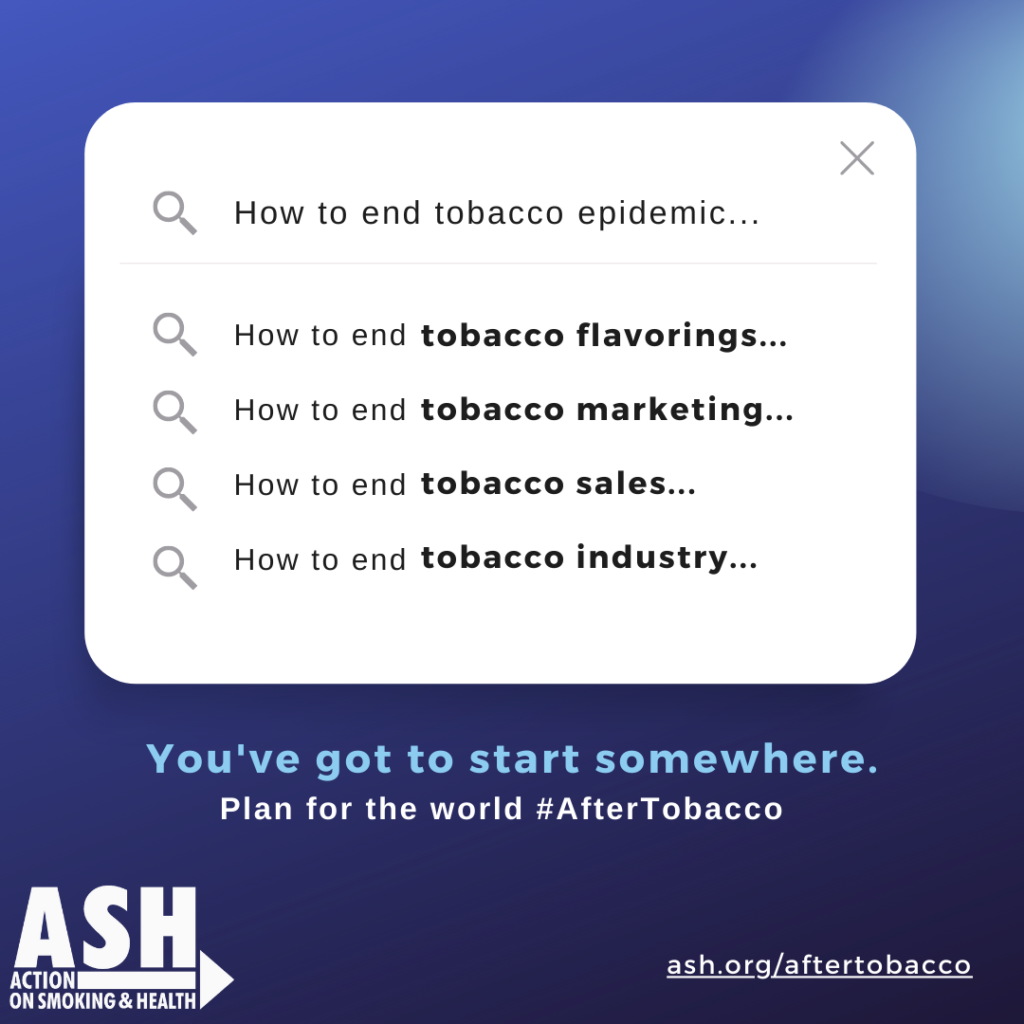Additional organizations continue to sign onto this letter. For the most recent number of signatory organizations, click here.
Media Contact:
Megan Arendt
arendtm@ash.org
(202) 390 – 9513
148 Organizations, Universities, and Cancer Centers Call for an End to Combustible Tobacco Sales
WASHINGTON, DC – MAY 24, 2021 – Our vision of a world without tobacco deaths is materializing. Today, ASH released an open letter calling on governments around the world to not only envision ending the tobacco epidemic but put in place concrete plans to make it happen. Not someday, or by 2050, or by 2100. We cannot simply burden future generations with an epidemic we can and should solve now. It’s time to go beyond only convincing people not to start or to quit smoking; we must remove the most dangerous consumer product in history from shelves. 
Read the letter signed by 148 organizations from 29 countries here>
Read The Washington Post’s coverage here>
 Tweet about the world #AfterTobacco here>
Tweet about the world #AfterTobacco here>
The signatories represent doctors, nurses, educators and advocates, all saying “Enough!” 100 million lives were lost to tobacco in the 20th century. If we don’t take drastic action, that will be the average death toll per decade this century.
“Tobacco companies will continue to sell cigarettes as long as it is profitable,” said Laurent Huber, Executive Director of Action on Smoking and Health (ASH). “So, it’s up to governments to protect their citizens from tobacco products and from the tobacco industry by planning to phase out the sale of combustible tobacco.”
Our heroic front line medical professionals see lives cut tragically short every day. Our ability to treat tobacco-caused disease is limited. Our ability to prevent those diseases in the first place is not.
“At what age would you want your child to start smoking cigarettes?” asked Micah Berman, JD, Associate Professor of Public Health and Law, Ohio State University. “The vast majority of people around the world—very much including people who currently smoke—want the next generation to live in a world free from the death and devastation caused by cigarette smoking. It’s long past time for our policy discussions to reflect that shared goal.”
The idea of phasing out tobacco sales is neither radical nor theoretical.
 Society has banned the sale of products that are far less harmful and even useful, like lead gasoline, chlorofluorocarbons, and asbestos. What is radical is allowing an addictive product that kills when used as intended to be more readily available than milk.
Society has banned the sale of products that are far less harmful and even useful, like lead gasoline, chlorofluorocarbons, and asbestos. What is radical is allowing an addictive product that kills when used as intended to be more readily available than milk.
The joint letter released today is the result of an ever-growing network of researchers and advocates who agree that it cannot be normal for a retail product to kill its consumers. Action on Smoking and Health (ASH US) and several other key partners host this community under the umbrella program named Project Sunset, which seeks to set the sun on big tobacco.
Project Sunset recognizes that the tobacco epidemic is not caused by people who smoke. It is caused by an industry that has promised repeatedly over the years to stop selling their products should they ever be deemed dangerous. The tobacco industry makes roughly $6,000 for every death they cause, and spend millions every hour pushing tobacco on “replacement smokers,” nearly always children. We would never allow another industry to get away with this.
Project Sunset is not prohibition. It is about phasing out the sale of commercial tobacco products, not possession or use. Some opponents (some funded by the tobacco industry) have warned that banning tobacco sales would give law enforcement new rationales to abuse their power, especially in communities of color. But it will never be illegal to hold a cigarette, or to grow tobacco, or even to buy it. This is only about commercial sales. And sacred use of tobacco, particularly among Native Americans, will remain sacred.
Ending tobacco sales is about more than just health.
It is an issue of morality, justice, equity and human rights. It is a violation of basic human rights to market and sell tobacco. Tobacco addiction compounds health inequities, especially among minority communities, who are preferentially targeted by tobacco industry marketing.
And there is growing agreement that what the tobacco industry does every day is not only immoral but criminal. Marketing and selling a product known to be addictive and deadly easily meets most definitions of murder.
Project Sunset has broad support. Polling shows that the public supports phasing out tobacco sales by a wide margin, especially among younger generations. A national poll ASH conducted with Stanford University suggested that at least half of people who smoke support it, and we have been contacted again and again by folks who want to quit but can’t because tobacco is in their face in every gas station and corner store.
Project Sunset is not theoretical; it is underway in a growing number of places:
- Beverly Hills and Manhattan Beach, CA banned all tobacco sales as of January 1, 2021.
- Balanga City, in the Philippines, passed a Tobacco-Free Generation (TFG) law, banning sales to anyone born after a certain date (the law is currently embroiled in a tobacco industry legal challenge).
- Brookline, MA also passed TFG; it is currently on the Massachusetts Attorney General’s desk for approval (expected in July).
- Dolgeville, NY and Bloomington, MN have made tobacco retail licenses an endangered species. No new licenses will be given, and existing ones can never be transferred.
- Canada, Ireland, Scotland, England, Sweden, Finland, Slovenia, and the Netherlands have developed ambitious plans to drastically lower tobacco use prevalence.
- New Zealand has proposed a raft of new measures to end the tobacco epidemic, including reducing nicotine to non-addictive levels, TFG, and banning cigarette filters.
- Even the U.S. has set a goal of less than 5% prevalence by 2030, although there is no roadmap to get there.
- California has put in motion a plan to virtually end the tobacco epidemic in the state by 2035, committing significant resources to the effort. ASH is one of the organizations funded to help.
The momentum to close the chapter on the tobacco pandemic is here.
As is the need to close this chapter: the tobacco pandemic death toll rivals that of the COVID-19 pandemic, with one substantial difference: the tobacco pandemic reaches that death toll every single year, not just once in a lifetime. It’s time for governments to act.
ACTION ON SMOKING AND HEALTH
Founded in 1967, Action on Smoking and Health (ASH) is America’s oldest anti-tobacco organization, dedicated to a world with ZERO tobacco deaths. Because tobacco is the leading cause of preventable death worldwide, ASH supports bold solutions proportionate to the magnitude of the problem. https://ash.org
Statements from Partners
- The University of Kansas Cancer Center: release here>








